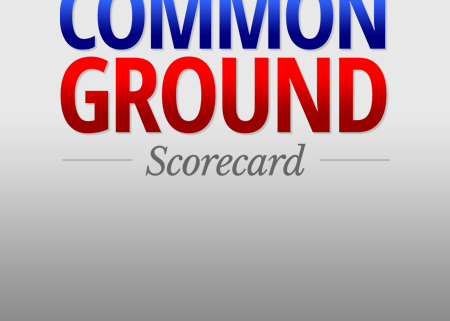Common Ground Scorecard Rates Politicians’ Commitment to Seek Agreement on Issues That Matter to Voters
The voter assistance tool scores politicians’ success at working across the aisle and celebrates average increase across House and Senate
Wilton, CT, July 13, 2022 – Common Ground Committee, Inc (CGC), a nonpartisan, citizen-led organization devoted to healing polarization and improving public discourse in politics, has updated politicians’ rankings in the Common Ground Scorecard. The scorecard is the first-ever model to assess the degree to which elected public officials and candidates for office seek points of agreement on social and political issues through listening and productive conversation, ranking politicians up to a maximum of 110 points, using aggregated data from the Lugar Index, GovTrack, the Bipartisan Policy Center and other data sources. Additional points can be earned via commitments to finding common ground going forward, or deducted for personal demonizing.
Voters will head to the polls this November amidst unprecedented challenges. This landscape necessitates a tool to help Americans see which candidates are most committed to working across the aisle to solve these issues. Using the Common Ground Scorecard, voters can search for public officials by name, state, or office held. They can also search using their own zip code to get a list of the officials that will appear on their ballots. They can see how those representatives have performed on finding common ground and making bipartisan progress.
“As we head towards a critical election cycle, it’s become increasingly clear that partisanship is getting in the way of solutions to the very real issues facing our nation,” said Bruce Bond, co-founder and CEO of Common Ground Committee. “Our hope is that the Scorecard will be a tool Americans will use to help them choose who they will vote for in the 2022 midterms.”
The highest-profile politicians have been scored. The average score is 29, the same as 2021 and up from 26 in 2020. Notable scores are as follows:
- President Joe Biden, 45/110, up from 43/110 in 2020
- Vice President Kamala Harris, 20/110, unchanged from 2020
- House Speaker Nancy Pelosi, 0/110, down from 29/110 in 2020
- House Minority Leader Kevin McCarthy, 37/110, up from 36/110 in 2020
- Senate Majority Leader Chuck Schumer, 30/110, up from 29/110 in 2020
- Senate Minority Leader Mitch McConnell, 32/110, up from 29/110 in 2020
Highest scoring lawmakers are:
- Representative Don Bacon (R NE-2), 104/110
- Representative Dean Phillips (D MN-3), 104/110
- Representative Gus Bilirakis (R FL-12), 100/110
- Representative Antonio Delgado (D NY-19), 100/110
- Representative Brian Fitzpatrick (R PA-1), 100/110
- Representative Abigail Spanberger (D VA-7), 100/110
- Governor Spencer Cox, (R UT), 99/110
- Representative Derek Kilmer (D WA-6), 97/110
- Representative Elissa Slotkin (D MI-8), 97/100)
- Representative Fred Upton (R MI-6), 97/110
- Representative Ed Case (D HI-1), 92/110
- Representative John Katko (R NY-24), 90/110
- Representative Elaine Luria (D VA-2), 90/110
- Representative David Trone (D MD-6), 90/110
- Senator Joe Machin (D WV), 83/110
- Representative Charlie Crist (D FL-13), 83/110
- Representative Anthony Gonzalez (R OH-16), 83/110
- Representative Young Kim (R CA-39), 83/110
- Representative Dutch Ruppersberger (D MD-2), 83/110
- Representative Joyce Beatty (D OH-3), 82/110
- Senator Maggie Hassan (D NH), 80/110
This video provides a short walkthrough of the scorecard and how to use it. A summary of the highest and lowest scorers can be found here. The most improved lawmakers since 2020 are:
- Representative Elissa Slotkin (D MI-8), 97/110, up from 42/110 in 2020
- Representative Young Kim (R CA-39), 83/110, up from 59/110 in 2021 (no score in 2020)
- Representative Peter Meijer (R MI-3), 76/110, up from 24/110 in 2021 (no score in 2020)
- Representative William Timmons (R SC-4), 52/110, up from 0/110 in 2020
- Governor Roy Cooper (D NC), 47/110, up from 34/110 in 2020
Common Ground Committee does not endorse political candidates. The organization’s only goal in providing the Common Ground Scorecard is to provide voters with an objective, up-to-date and easy-to-understand tool to discover how likely their elected officials or candidates for public office are to work with the opposite party to find common ground.
For interview requests, please contact Zachary Halper at zhalper@momentum-cg.com or 862-224-3233
###
About Common Ground Committee
Common Ground Committee (CGC) is a nonpartisan, nonprofit 501(c)3 citizen-led organization dedicated to fostering more progress and less division in politics. Since its founding in 2009, CGC has held 17 public forums featuring panelists who have reached over 200 points of consensus. Panelists have included such notable pairings as John Kerry and Condoleezza Rice, David Petraeus and Susan Rice, Michael Steele and Donna Brazile, and Larry Kudlow and Barney Frank, exploring issues ranging from race and income inequality to foreign policy. CGC produces the “Let’s Find Common Ground” podcast series, which has had over 100 thousand downloads. CGC created the Common Ground Scorecard, a voting tool that scores politicians and candidates for public office on their likelihood to find common ground with the opposite party. Free of political agenda and financial influence, CGC has a singular focus on bringing light, not heat, to public disc





